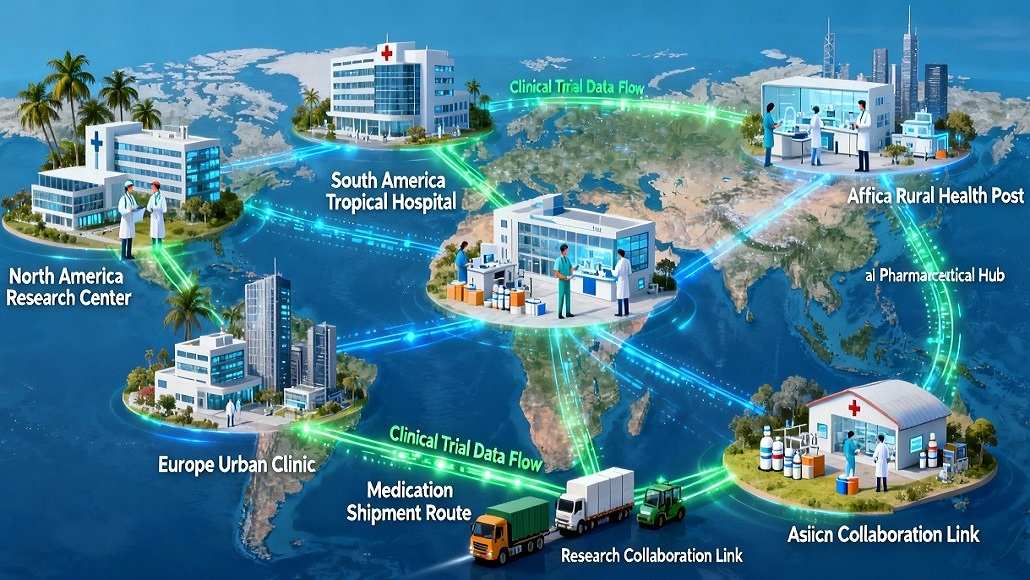Modern clinical trial supply chains have evolved dramatically from straightforward logistics operations to sophisticated, technology-enabled systems that integrate advanced analytics, real-time inventory visibility, adaptive packaging strategies, and multi-country regulatory compliance. This transformation reflects recognition that clinical supply chain excellence directly impacts trial timelines, data quality, and patient safety. The comparator drug sourcing market alone is valued at USD 1.16 billion in 2023, projected to reach USD 2.24 billion by 2034, indicating systematic expansion of services supporting sophisticated clinical supply operations.
Multi-Country Labeling and Regional Compliance Complexity
Advanced clinical supply solutions have evolved to manage unprecedented complexity inherent in global clinical trials. Contemporary studies operate across multiple countries, each with distinct regulatory requirements for investigational drug labeling, documentation, and distribution protocols. Rather than applying uniform labeling across trial sites, sophisticated pharmaceutical companies now employ advanced clinical supply solutions that accommodate region-specific requirements while maintaining central quality standards and study consistency.
Multi-country labeling requires careful coordination between central label design teams and regional regulatory specialists. Each region demands distinct safety information, language requirements, regulatory approval processes, and even physical label specifications. Pharmaceutical companies conducting advanced clinical supply operations now leverage centralized design with regional customization—creating master label templates that accommodate regional variations without compromising study integrity or regulatory compliance.
Label text quantity represents a particular challenge in advanced clinical supply operations. Modern drug labeling frequently requires substantial regulatory information, safety statements, and protocol-specific guidance. For small-volume investigational products packaged in vials or pre-filled syringes, accommodating required label text within physical packaging constraints demands sophisticated engineering solutions. Advanced clinical supply partners employ innovative label designs, alternative packaging materials, and specialized printing technologies that accommodate required text while maintaining regulatory compliance and product integrity.
Real-Time Inventory Visibility and Just-in-Time Operations
One of the most significant innovations in advanced clinical supply solutions is the shift toward just-in-time manufacturing and real-time inventory visibility. Traditional clinical supply models pre-packaged large quantities of investigational drugs well in advance of trial initiation, creating substantial risk of expiration, unnecessary waste, and inflexibility when protocol modifications required packaging changes. Modern advanced supply solutions implement on-demand packaging and labeling specifically timed to match trial enrollment velocity and site allocation requirements.
Just-in-time packaging dramatically reduces investigational drug waste while simultaneously improving supply chain flexibility. As trial enrollment and patient attrition evolve, supply systems can rapidly adjust package quantities allocated to individual sites, eliminating premature expiration and reducing inventory holding costs. This approach proves particularly valuable for studies involving high-value investigational drugs with limited stability windows or therapies addressing rare disease indications with inherently unpredictable patient recruitment patterns.
Real-time inventory visibility systems employ sophisticated tracking technologies, barcode scanning, and cloud-based data platforms that provide complete visibility into investigational drug location, quantity, temperature history, and expiration status throughout the global supply chain. Pharmaceutical companies can rapidly identify inventory locations, rebalance supplies across under-enrolled and over-enrolled sites, and implement rapid contingency responses should supply disruptions occur. This visibility enables proactive supply chain management that substantially reduces enrollment delays and trial interruptions.
Comparator Drug Sourcing Sophistication
The comparator drug sourcing market has undergone substantial evolution toward advanced solutions incorporating global sourcing networks, real-time market intelligence, and AI-enabled supplier risk assessment. Top pharmaceutical companies collectively spend more than USD 20 million annually on comparator sourcing, reflecting both the criticality of comparator supply and the complexity inherent in maintaining uninterrupted supplies across global trial sites.
Advanced comparator sourcing solutions leverage three distinct sourcing models: direct sourcing from originator companies, open-market procurement from established distributors and wholesalers, and hybrid approaches combining direct and market-based sourcing. Specialist comparator sourcing vendors provide invaluable expertise through their established relationships with manufacturers, distributors, and local pharmaceutical supply chains. These partnerships enable comparator access at substantially reduced costs—often achieving 50 percent price reductions through European Union sourcing—while simultaneously reducing supply delays through vendor understanding of manufacturing timelines and upcoming market demand variations.
Artificial intelligence and machine learning technologies are revolutionizing comparator sourcing by enabling rapid supplier identification, market intelligence analysis, and risk assessment across global suppliers. AI systems analyze vast datasets regarding comparator availability, pricing trends, regulatory status, and supplier reliability, enabling pharmaceutical companies to identify optimal sourcing strategies with minimal human intervention. This data-driven approach substantially reduces comparator sourcing timelines while improving cost optimization and supply reliability.
Adaptive Packaging Strategies for Complex Trials
Adaptive packaging represents another critical innovation within advanced clinical supply solutions. Rather than designing packaging for a single trial configuration and maintaining that design throughout the study, adaptive packaging strategies anticipate likely protocol modifications and design packaging architectures that can rapidly accommodate changes with minimal disruption or waste.
Factors requiring adaptive packaging capabilities include changing comparator drugs during the trial, protocol amendments affecting dosage regimens, modifications to inclusion/exclusion criteria affecting patient subgroups, and adjustments to site allocation reflecting actual enrollment patterns. Traditional packaging approaches would require complete re-packaging and re-labeling following protocol changes—an expensive, time-consuming process that delays trial progress. Advanced packaging solutions employ modular designs, changeable labels, and flexible kitting strategies that accommodate modifications quickly and cost-effectively.
Temperature-sensitive investigational drugs, particularly biologics and cell therapies, demand exceptional packaging sophistication. Ultra-cold storage requirements—often at -60°C or below—create unique challenges for labeling, carton assembly, and material compatibility. Advanced packaging solutions employ materials selected specifically for ultra-cold performance, adhesives that maintain functionality at cryogenic temperatures, and labeling technologies capable of application under extreme temperature conditions. These specialized capabilities ensure that investigational drugs maintain packaging integrity throughout complex cold-chain logistics.
Serialization Upgrades and Track-and-Trace Technologies
Pharmaceutical serialization—assigning unique identifiers to individual product units—has become mandatory in most developed markets and increasingly in emerging markets. Beyond compliance requirements, advanced clinical supply solutions leverage serialization and track-and-trace technologies to enhance supply chain visibility, prevent counterfeiting, and enable rapid recall management should safety concerns emerge.
Modern serialization systems integrate alphanumeric codes containing product information, batch numbers, and expiration dates in both human-readable and two-dimensional barcode formats. These codes enable automated scanning throughout the supply chain, providing real-time visibility regarding product location, custody transfer, and distribution status. For clinical trials managing multiple investigational drugs and comparators across geographically dispersed sites, serialization technologies substantially enhance supply chain control and enable rapid response to safety or quality concerns.
Adaptive Trial Design Support
Advanced clinical supply solutions increasingly support decentralized and adaptive trial designs that fundamentally change supply chain requirements. Decentralized trials—which enable patients to receive investigational drugs at home or local clinics rather than traveling to centralized trial sites—eliminate the geographic concentration inherent in traditional trial models. This model requires more sophisticated supply chain capabilities to manage direct-to-patient drug delivery, home-based sample collection, and distributed storage across multiple locations.
Adaptive trial designs—which permit real-time modification to trial parameters based on accumulating safety and efficacy data—require supply chain flexibility that traditional approaches cannot provide. Advanced supply solutions employ predictive analytics to anticipate likely trial modifications, enabling proactive supply chain adjustments that accommodate expected changes with minimal disruption. This capability substantially reduces delays inherent in reactive supply chain modifications and supports accelerated trial completion timelines.
Strategic Value and Competitive Positioning
The shift toward advanced clinical supply solutions reflects recognition that supply chain excellence directly impacts trial success and time-to-market achievement. Pharmaceutical companies successfully implementing sophisticated supply strategies combining multi-country regulatory compliance, real-time inventory visibility, comparator sourcing expertise, adaptive packaging, and serialization capabilities gain substantial competitive advantage through reduced development timelines, minimized supply chain disruptions, and enhanced ability to manage complex global trial operations. As clinical trial complexity intensifies and geographic dispersion accelerates, advanced supply solutions will become increasingly important competitive differentiators within the pharmaceutical industry.

























